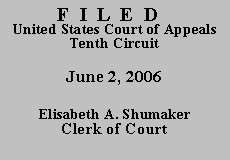

| ERIC LIGHTNER,
v.
AL ESTEP, Warden |
No. 06-1050
(D.C. No. 05-CV-2096-ZLW) (D. Colo.) |
CERTIFICATE OF APPEALABILITY
In 1993, Lightner was convicted of first degree murder, three counts of attempted first degree murder, second degree assault, conspiracy to commit first degree assault, and conspiracy to commit menacing. For these crimes, Lightner was sentenced to life imprisonment without parole, plus fifty years. According to his federal habeas petition, he directly appealed his convictions, and on September 28, 1995, the Colorado Court of Appeals substantially affirmed, vacating one count of attempted first degree murder. Lightner sought review by the Colorado Supreme Court, but certiorari was denied on April 15, 1996. On December 30, 1996, he filed a state petition for postconviction relief, and on July 30, 1998, this petition was denied. His appeal of the denial of this petition was also unsuccessful. A second petition for postconviction relief followed on May 12, 2002, and on May 30, 2003, the state district court denied the petition. His appeal from this denial was also unavailing.
On October 21, 2005, Lightner filed this § 2254 petition in federal district court. A magistrate judge ordered Lightner to show cause why his application should not be dismissed as barred by the one-year limitation period set forth in 28 U.S.C. § 2244(d). Lightner responded that he was actually innocent, and that the court should equitably toll the limitations period. He also argued that an unconstitutional state-created impediment prevented him from filing on time. The magistrate judge recommended dismissal, and the district court adopted the magistrate's recommendation. Lightner's subsequent application for a COA was denied. Having failed to secure a COA from that court, Lightner now seeks a COA from this court.(1)
The statute of limitations for applications for a writ of habeas corpus is set forth in 28 U.S.C. § 2244(d). It states:
(1) A 1-year period of limitation shall apply to an application for a writ of habeas corpus by a person in custody pursuant to the judgment of a State court. The limitation period shall run from the latest of
(A) the date on which the judgment became final by the conclusion of direct review or the expiration of the time for seeking such review;
(B) the date on which the impediment to filing an application created by State action in violation of the Constitution or laws of the United States is removed, if the applicant was prevented from filing by such State action;
(C) the date on which the constitutional right asserted was initially recognized by the Supreme Court, if the right has been newly recognized by the Supreme Court and made retroactively applicable to cases on collateral review; or
(D) the date on which the factual predicate of the claim or claims presented could have been discovered through the exercise of due diligence.
(2) The time during which a properly filed application for State post-conviction or other collateral review with respect to the pertinent judgment or claim is pending shall not be counted toward any period of limitation under this subsection.
Because this law went into effect on April 24, 1996, after Lightner's conviction became final, Lightner had until April 24, 1997, to file his petition. See United States v. Hurst, 322 F.3d 1256, 1260 (10th Cir. 2003).
On appeal, Lightner concedes his petition was untimely under AEDPA. He argues, however, that we should equitably toll his petition because he is actually innocent. This actual innocence claim, however, is nothing more than an unsubstantiated allegation that the state destroyed exculpatory evidence. As such, we reject it. See Schlup v. Delo, 513 U.S. 298, 324 (1995) (holding that, to be credible, a petitioner must support his allegations of innocence with "new reliable evidence whether it be exculpatory scientific evidence, trustworthy eyewitness accounts, or critical physical evidence that was not presented at trial").
Lightner also argues his delay in filing his federal petition was justified because the time between his two state court postconviction motions should not count against the one-year limitation period. Specifically, he argues that Colorado's provision for a successive Rule 35(c) motion is an unconstitutional state-created impediment to his timely filing of a federal habeas petition. Because Lightner does not explain how the ability to file a successive Rule 35(c) motion actually prevented him from timely filing the instant action, we cannot excuse his delay. See Lloyd v. Van Natta, 296 F.3d 630, 633 (7th Cir. 2002) (noting that whatever constitutes an impediment under § 2244(d)(1)(B) must prevent an applicant from filing a federal habeas corpus application).
Accordingly, we DENY Lightner's request for a COA and DISMISS the appeal. Lightner's application to proceed in forma pauperis is also DENIED.
ENTERED FOR THE COURT
Carlos F. Lucero
Circuit Judge
1. Lightner's petition was filed after April 24, 1996, the effective date of the Antiterrorism and Effective Death Penalty Act ("AEDPA"); as a result, AEDPA's provisions apply to this case. See Rogers v. Gibson, 173 F.3d 1278, 1282 n.1 (10th Cir. 1999) (citing Lindh v. Murphy, 521 U.S. 320 (1997)). AEDPA conditions a petitioner's right to appeal a denial of habeas relief under § 2254 upon a grant of a COA. 28 U.S.C. § 2253(c)(1)(A). A COA may be issued "only if the applicant has made a substantial showing of the denial of a constitutional right." § 2253(c)(2). This requires Lightner to show "that reasonable jurists could debate whether (or, for that matter, agree that) the petition should have been resolved in a different manner or that the issues presented were adequate to deserve encouragement to proceed further." Slack v. McDaniel, 529 U.S. 473, 484 (2000) (quotations omitted). Because the district court denied Lightner a COA, he may not appeal the district court's decision absent a grant of COA by this court.